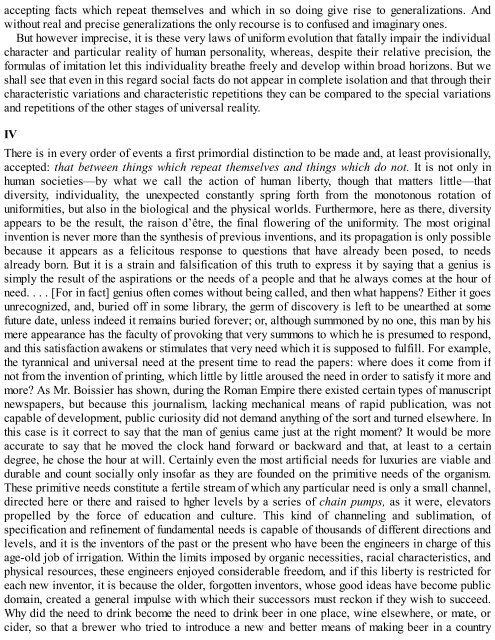3658925934
You also want an ePaper? Increase the reach of your titles
YUMPU automatically turns print PDFs into web optimized ePapers that Google loves.
accepting facts which repeat themselves and which in so doing give rise to generalizations. And<br />
without real and precise generalizations the only recourse is to confused and imaginary ones.<br />
But however imprecise, it is these very laws of uniform evolution that fatally impair the individual<br />
character and particular reality of human personality, whereas, despite their relative precision, the<br />
formulas of imitation let this individuality breathe freely and develop within broad horizons. But we<br />
shall see that even in this regard social facts do not appear in complete isolation and that through their<br />
characteristic variations and characteristic repetitions they can be compared to the special variations<br />
and repetitions of the other stages of universal reality.<br />
IV<br />
There is in every order of events a first primordial distinction to be made and, at least provisionally,<br />
accepted: that between things which repeat themselves and things which do not. It is not only in<br />
human societies—by what we call the action of human liberty, though that matters little—that<br />
diversity, individuality, the unexpected constantly spring forth from the monotonous rotation of<br />
uniformities, but also in the biological and the physical worlds. Furthermore, here as there, diversity<br />
appears to be the result, the raison d’être, the final flowering of the uniformity. The most original<br />
invention is never more than the synthesis of previous inventions, and its propagation is only possible<br />
because it appears as a felicitous response to questions that have already been posed, to needs<br />
already born. But it is a strain and falsification of this truth to express it by saying that a genius is<br />
simply the result of the aspirations or the needs of a people and that he always comes at the hour of<br />
need. . . . [For in fact] genius often comes without being called, and then what happens? Either it goes<br />
unrecognized, and, buried off in some library, the germ of discovery is left to be unearthed at some<br />
future date, unless indeed it remains buried forever; or, although summoned by no one, this man by his<br />
mere appearance has the faculty of provoking that very summons to which he is presumed to respond,<br />
and this satisfaction awakens or stimulates that very need which it is supposed to fulfill. For example,<br />
the tyrannical and universal need at the present time to read the papers: where does it come from if<br />
not from the invention of printing, which little by little aroused the need in order to satisfy it more and<br />
more? As Mr. Boissier has shown, during the Roman Empire there existed certain types of manuscript<br />
newspapers, but because this journalism, lacking mechanical means of rapid publication, was not<br />
capable of development, public curiosity did not demand anything of the sort and turned elsewhere. In<br />
this case is it correct to say that the man of genius came just at the right moment? It would be more<br />
accurate to say that he moved the clock hand forward or backward and that, at least to a certain<br />
degree, he chose the hour at will. Certainly even the most artificial needs for luxuries are viable and<br />
durable and count socially only insofar as they are founded on the primitive needs of the organism.<br />
These primitive needs constitute a fertile stream of which any particular need is only a small channel,<br />
directed here or there and raised to hgher levels by a series of chain pumps, as it were, elevators<br />
propelled by the force of education and culture. This kind of channeling and sublimation, of<br />
specification and refinement of fundamental needs is capable of thousands of different directions and<br />
levels, and it is the inventors of the past or the present who have been the engineers in charge of this<br />
age-old job of irrigation. Within the limits imposed by organic necessities, racial characteristics, and<br />
physical resources, these engineers enjoyed considerable freedom, and if this liberty is restricted for<br />
each new inventor, it is because the older, forgotten inventors, whose good ideas have become public<br />
domain, created a general impulse with which their successors must reckon if they wish to succeed.<br />
Why did the need to drink become the need to drink beer in one place, wine elsewhere, or mate, or<br />
cider, so that a brewer who tried to introduce a new and better means of making beer in a country









![Genki - An Integrated Course in Elementary Japanese II [Second Edition] (2011), WITH PDF BOOKMARKS!](https://img.yumpu.com/58322134/1/180x260/genki-an-integrated-course-in-elementary-japanese-ii-second-edition-2011-with-pdf-bookmarks.jpg?quality=85)
![Genki - An Integrated Course in Elementary Japanese I [Second Edition] (2011), WITH PDF BOOKMARKS!](https://img.yumpu.com/58322120/1/182x260/genki-an-integrated-course-in-elementary-japanese-i-second-edition-2011-with-pdf-bookmarks.jpg?quality=85)





